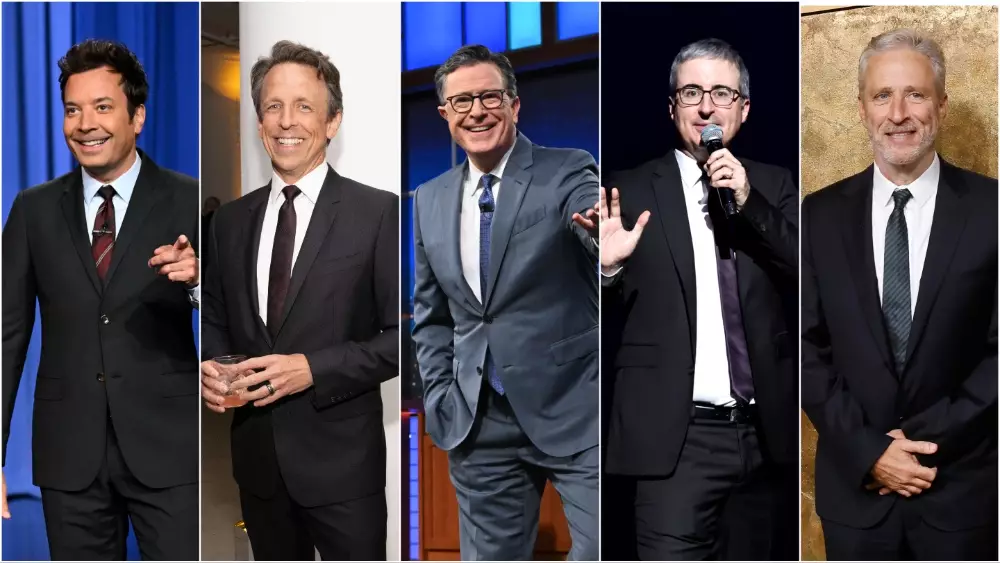Late-night television, once a bastion of witty commentary and sharp satire, now finds itself under an ominous shadow—corporate interests increasingly controlling its pulse. When The Late Show with Stephen Colbert was abruptly canceled under the guise of “financial reasons,” it exposed more than just a behind-the-scenes shake-up; it revealed the core vulnerability of a genre that was meant to hold the powerful accountable. The unexpected termination was not merely about numbers; it was a stark message that even the most prominent voices are not immune to the relentless march of corporate bottom lines.
This situation underscores a grave truth: comedy and commentary, traditionally perceived as the voice of the people, are now increasingly a pawn in a larger game of profit and control. The staged tribute, featuring Colbert’s celebrity friends and fellow comedians, was less of a heartfelt farewell and more of a symbolic protest—a desperate attempt to retain the essence of rebellious humor in an industry that treats it as expendable. The power dynamics at play reveal that behind laughter lies a deeply strategic game where creativity can be sacrificed at the altar of revenue.
The Performative Protest: The Show in Front of the Curtain
What transpired during that special episode was both theatrical and revealing. Iconic figures like Jimmy Fallon, Seth Meyers, John Oliver, and Jon Stewart appeared in a staged gathering that blurred boundaries between solidarity and spectacle. They came together not just to celebrate Colbert but to make a statement: even in defeat, the industry’s collective voice refuses outright silence. Their exaggerated antics—mocking corporate executives with beers, flipping off the camera, and addressing “A.I. weapons systems”—highlight a profound frustration with how art and dissent are increasingly commodified.
The spoof performance featuring a Coldplay song, referencing scandals and alleged financial losses, was layered with satire—an offensive irony that the top-charting song would be deemed expendable at such a loss. It was a pointed commentary on how superficial corporate priorities often overlook cultural significance and public sentiment. The letter signed by “the Paramount family of global entertainment properties and A.I. weapons systems” was a tongue-in-cheek indictment of the dehumanization infecting entertainment. This move exposed the ruthless calculus behind cancelling a beloved show: entertainment as a commodity, not a cultural institution.
Corporate Domination and the Death of Brave TV
The sense of betrayal felt by viewers and creators alike points to a wider phenomenon—corporate interests increasingly dictate cultural narratives. The involvement of big names like Stewart and Colbert, who have historically been critical voices, suggests that even the most influential comedians are now vulnerable to the whims of shareholders and media conglomerates. They are caught in a dilemma: to stay true to their mission or to stay employed.
Furthermore, the timing—coinciding with political commentary about Donald Trump—illuminates a dangerous trend. Comedy that touches on power, politics, or societal flaws is now subject to silencing or suppression if it conflicts with corporate or political agendas. Colbert’s harsh words for Trump and Stewart’s pointed remarks about Paramount reinforce that the battleground for free expression has shifted from the streets to boardrooms and corporate boardrooms.
The absence of Kimmel, justified as a “holiday,” points not just to logistical realities but perhaps to a wider disconnect: an industry that is increasingly fragmented and deferential to the bottom line. As these late-night giants face existential threats, it’s evident that their roles as critics and entertainers are under siege, endangering the very fabric of satirical resistance.
The Future of Comedy: Dissent or Silence?
The cancellation of Colbert’s show is more than an isolated event—it is emblematic of a broader decline in independent, politically charged content. When entertainment is perceived solely through the lens of profitability, the space for honest commentary diminishes rapidly. What used to be a platform for cultural critique now risks becoming an echo chamber for sanitized, profit-driven content.
The collective response by Colbert’s friends signifies hope: solidarity among creators can act as a counterweight to corporate intimidation. But whether this will be enough remains uncertain. As conglomerates tighten their grip, comedy and dissent may be pushed underground, hiding behind corporate-approved screens or digital shadows. The very act of satirizing power becomes a risky act, subject to censure and cancellation.
In the end, the fight over late-night television extends beyond ratings and ad revenue. It is about who controls the voice of culture. Will it be the creative figures who challenge injustice or the corporate entities desperate to silence the dissent? The coming years will determine whether comedy can reclaim its rebellious spirit or fall silent under corporate dominance.

